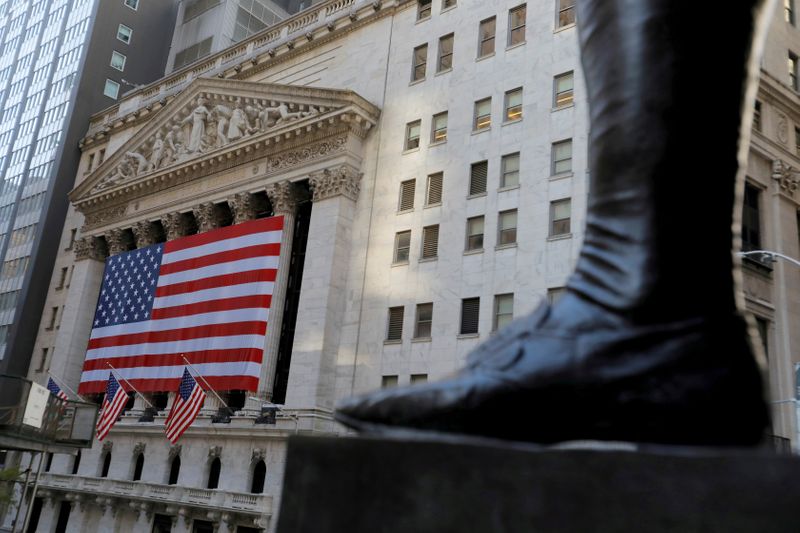By Chuck Mikolajczak
NEW YORK (Reuters) -U.S. stocks ended a tumultuous year with the Dow and S&P 500 at records, as the three major U.S. equity indexes notched solid-to-spectacular yearly gains despite an economy upended by the COVID-19 virus as investors looked to a post-pandemic world.
In a year that marked the end of the longest bull market on record as pandemic-induced government lockdowns battered the global economy, equities stormed back, with the S&P 500 climbing more than 66% from its March 23 low, resulting in the shortest bear market in history.
The gains, which sent the Dow and S&P to record highs to close out the year and the Nasdaq to a record earlier this week, were fueled in part by massive fiscal and monetary stimulus put in place to buttress the economy reeling from the coronavirus fallout, as well as progress on a vaccine.
For the year, the S&P 500 gained 16.3%, the Dow 7.2% and the Nasdaq 43.6%, which marked the biggest yearly gain for the tech-heavy index since 2009.
"For broad indexes, this is a bullish year despite the craziness in the real world," said Mike Zigmont, head of research and trading at Harvest Volatility Management.
"It feels very much to me like investors have decided the world has changed forever, the coronavirus pandemic was the catalyst and now investors have decided who the winners are and who the losers are and are moving forward."
Still, data on Thursday was a reminder the economy still has a lengthy recovery ahead as weekly initial jobless claims, while declining for a second straight week to 787,000, remained well above the peak of the 2007-2009 Great Recession.
Tech and consumer discretionary were the best performing sectors on the year, while energy, a laggard for the past decade, was once again the weakest of the 11 major S&P sectors on the year en route to its worst yearly performance ever.
Mega-cap companies such as Amazon (NASDAQ:AMZN) and Apple (NASDAQ:AAPL) helped lift the broad S&P 500 and the Nasdaq, as well as gains in names that have benefited from the "stay-at-home" environment, such as online retailer ETSY Inc and digital payment platform PayPal.
Shares of Tesla (NASDAQ:TSLA) added to the benchmark S&P index on December 21, rose an astounding 743% on the year.
For the session the Dow Jones Industrial Average rose 196.92 points, or 0.65%, to 30,606.48, the S&P 500 gained 24.03 points, or 0.64%, to 3,756.07 and the Nasdaq Composite added 18.28 points, or 0.14%, to 12,888.28.
All three major indexes gained ground, with the Dow and S&P 500 picking up steam in the session's final minutes to secure record highs.
Near-term expectations of bigger stimulus checks dimmed after Senate Majority Leader Mitch McConnell blocked a quick vote on Wednesday to back President Donald Trump's call to increase COVID-19 relief checks to $2,000 from $600.
Risk assets were able to build on the rally off the March low, adding to gains in November following a U.S. election that investors viewed as likely to result in political gridlock and optimism around vaccines approvals grew, but the momentum stalled on worries over fresh fiscal stimulus and a new, highly infectious COVID-19 variant spreading globally.
All eyes are on two U.S. Senate races in Georgia next week that will determine control of the chamber and influence Democratic President-elect Joe Biden's ability to enact his agenda.
Volume on U.S. exchanges was 9.27 billion shares, compared with the 10.81 billion average for the full session over the last 20 trading days.
Advancing issues outnumbered declining ones on the NYSE by a 1.44-to-1 ratio; on Nasdaq, a 1.13-to-1 ratio favored decliners.
The S&P 500 posted 29 new 52-week highs and no new lows; the Nasdaq Composite recorded 131 new highs and 21 new lows.
